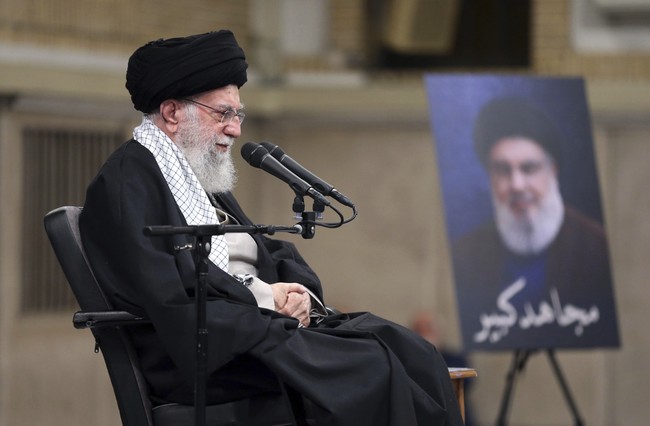
Bold strategy, Cotton. Let’s see if it pays off for them.
How good are the Iranians at dodgeball, anyway? They may be about to find out, according to Reuters. According to an Iranian diplomat attached to the talks, Iran may be ready to walk away from the table and call Donald Trump’s bluff. But it’s not really Trump’s bluff, and it’s not really a bluff either:
Iran is poised to reject a US proposal to end a decades-old nuclear dispute, an Iranian diplomat said on Monday, dismissing it as a “non-starter” that fails to address Tehran’s interests or soften Washington’s stance on uranium enrichment.
“Iran is drafting a negative response to the US proposal, which could be interpreted as a rejection of the US offer,” the senior diplomat, who is close to Iran’s negotiating team, told Reuters. …
After five rounds of discussions between Iranian Foreign Minister Abbas Araghchi and President Donald Trump’s Middle East envoy Steve Witkoff, several obstacles remain.
Among them are Iran’s rejection of a US demand that it commit to scrapping uranium enrichment and its refusal to ship abroad its entire existing stockpile of highly enriched uranium — possible raw material for nuclear bombs.
Interestingly, none of the major US outlets have picked up on this report, even though they routinely carry Reuters material. Perhaps they think that Reuters’ soucing is too thin, although this looks every bit as solid as the kind of rumor-publishing that the NY Times, WaPo, and CNN routinely do with the Trump administration. The impression this leaves is that the American media don’t want to publish developments that might justify a tougher line with Tehran, even if a tougher line is warranted.
Israeli media outlet Walla reported today that the US may back down from its no-enrichment-at-all position, which administration officials deny:
The US nuclear deal proposal that was allegedly given to Iran would allow limited and low-level uranium enrichment, Walla reported on Monday.
Limited uranium enrichment would be for a “to-be-determined” period of time, Walla said. This proposal contradicts statements from top officials.
The administration may deny it, but other officials have floated that idea in the American media before. And that may come in the form of an “interim deal,” Elliott Abrams predicts at National Review, via an understandably skeptical Scott Johnson at Power Line:
Think of an interim deal of, say, one year — during which a comprehensive agreement will theoretically be negotiated. Under this deal, Iran agrees to kiss and make up with the IAEA, allowing the full inspections it has never granted. It agrees to stop enriching above 3.67 percent. It agrees to export or down-blend most of its stocks of uranium enriched above, say, 20 percent.
The Trump administration can call this a great victory that only the president could have reached. The Iranian program is frozen, they move back from being so close to ten bombs, and the IAEA can ensure that they keep their promises. …
What’s the problem with this supposedly temporary deal?
First, there will never be a final deal. Iran’s goal in an interim arrangement would be to prevent a U.S. military strike and enlist the United States in preventing an Israeli strike because, the Trump administration would tell the Israelis, “we are still negotiating.” Iran will play out the clock, hoping for the administration to be weakened by a defeat in the 2026 congressional elections and then gone after the 2028 elections.
Second, under such a “interim” deal, Iran would keep its centrifuges and — as we have seen in the last few months — can start spinning them whenever it wants. It would thereby again create hundreds of pounds of highly enriched uranium in just a few months.
The biggest problem with a temporary deal, Abrams concludes, is that the Iranians will cheat on it regardless. The latest IAEA report demonstrates that beyond any doubt. However, that’s the problem with any deal with the mullahs in Tehran, temporary or otherwise. Iran has cheated on agreements regarding nuclear development for well over two decades, and they are still cheating to this very moment. So what’s the point of any agreement without real enforcement backed by the threat of dire consequences, and why should we settle for anything less in the interim?
Scott points out that Trump may really be bluffing, since he’s not inclined to start wars and wants a “big beautiful deal” to claim victory. However, it doesn’t matter if Trump is bluffing, because Benjamin Netanyahu most certainly isn’t bluffing. Netanyahu would have already hit the Iranian nuclear facilities by now if Trump hadn’t pressured him to stand down in favor of the talks currently underway. Trump can’t let the Iranians continue to enrich uranium because Netanyahu will strike Iran even with that deal in place and let those chips fall where they may. This is an existential question for Israel, which cannot allow Iran to achieve nuclear-weapons status and just wait for the day the mullahs decide to take out Tel Aviv.
The smartest outcome would be for the US to refuse the deal, keep holding Israel off for a while, and apply the “maximum pressure” sanctions that will cut off income to the IRGC and raise the stakes with Iran’s restive population, especially the democracy-oriented middle class of Tehran. It might not take much to tip this regime over in an economic crisis, especially one in which the IRGC finds its access to wealth and income cut off. Rather than talk about accommodation with the radical Islamists of the IRGC and mullahs, we should start orienting policy toward the people of Iran to encourage them as much as possible to make this their moment, rather than ours or Israel’s. The only way to secure this region from extremist nuclear blackmail is to rid it of the terrorist regime holding Iranians in their grip.








